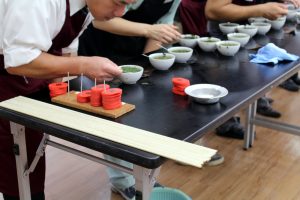I’m not being pessimistic, it’s just a humbling realization.
The world of tea is immense.
My focus is Japanese tea, which is just a tiny part, but even then I’m always learning about things that I didn’t know about.
Here are my reasons why true expertise on all the teas of the world is unattainable.
There are too many different teas
I estimate that there are easily more than 50 different types of green teas in the world by processing method. If you add just one variable like producing region, the numbers quickly rise.
Let’s see a concrete example.
How many different gyokuro have you tried? From which regions and which cultivars?
If you haven’t tried that many, can you really be considered an expert regarding that tea?
It takes a long time to be able to master a specific tea
I’ve been drinking Japanese teas for many years but I don’t stand a chance next to professional tea tasters in Japan, who taste different teas every day.
I can tell if a sencha is of high quality or not, but that’s about it. A true expert can detect many more things, but it takes time to develop this skill.
But even an experienced tea taster won’t be able to easily translate his judging ability to teas from another part of the world.
Since it takes time to truly master any tea, and there are so many teas, it would take a lifetime.
And then there’s the difficulty in getting the right samples for your training because some high end teas are very expensive and there might be many counterfeit teas in that market.
I think that this problem applies to pu-erh especially. It’s definitely not a tea that you can master in a short time.
Tea certification still has a long way to go
Besides what I’ve mentioned before, since tea certification has no international standard it’s not easy to determine if someone is an expert.
Even if you are certified, it just means that you know more than the average person. But you could still have a lack of experience in a lot of teas, or compare poorly with someone who has had an education involving more time or higher quality.
I think that we should put our ego aside and just enjoy this never ending journey.
That’s a big part of what I like about tea. There’s always something new to discover.


November 28, 2019
Very true! Although as someone who drinks tea for the taste and the adventure, the breadth of tea is what really appeals to me. So much to explore!
March 15, 2020
Couldn’t agree more. Maybe one can be an “expert” for all the different types of tea of one region. For example being an expert on all the whites, greens, partically oxidised and fully oxidised teas from Nepal.
Alternatively, one could be very knowledgeable about one particular type of tea. For example the process making green across several regions so that you can pick up nuances like Aokusami 青臭み in green teas.
Ergo, it would be better not to try to have an “international” standard certificate.
My two bit conclusion!